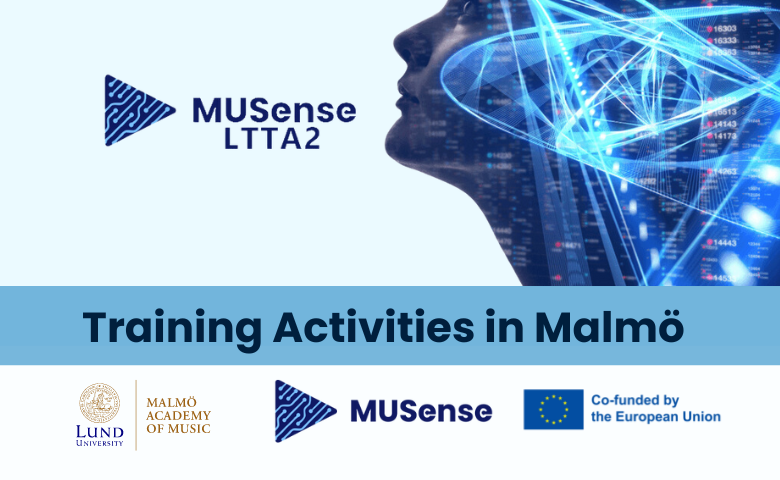The LTTA2 in Malmö focused on new learning strategies and methods in digital learning for music students in higher musical education (HME), such as innovative IT models, cyber and distance performance techniques and strategies. The program consisted of lectures, workshops, performances and seminars with international researchers, teachers and stage performance artists from the participating music academies.
MUSENSE – Music Higher Education Meets the Cyber Dimension
MUSENSE project is a cooperation partnership project funded by the European Commission’s Erasmus+ programme and coordinated by the Conservatoire of Music ‘A. Scarlatti’ in Palermo.
The project plans to create new skills among students of higher music education institutions in the field of live performance, a sector that was particularly affected by the COVID crisis. The current art situation calls for a unique mindset revolution able to transform the normal chain of art teaching and expression that has been around for centuries.
The arrow coming from the authors and ending in a seated public in a concert hall or theatre seemed to be for a long time the only possible way to communicate. Similarly, the teaching model has hardly changed over the last century. No surprise that the new digital opportunities have been seen by HEIs and artists with suspicion and are still considered as a side activity in the music and art set while, doubtlessly, they will be a consistent part of the future of education and art communication.
The health crisis, in a few months, showed that HEIs and the music and art world need to find a new way to operate and HE music students themselves should dramatically rethink their skills and communication processes. In the lockdown era, new performances have been among the most diverse, and, although the attempts were many, the methods were confusing and sometimes opposite.
A new relationship with the audience should include the following characteristics: live, remote, cyber, social, replicable, sustainable, and profitable.
MUSENSE takes on this challenge and aims to explore the implication that comes from these changes. In this sense, the central feature of MUSense is to educate and forge HE’s music staff and students in order to acquire and embrace the digital shift while improving skills in cyber and live innovative performances, involving renewed art practices.
In addition to the HEIs, the new actors of this change will be the Creative Industries, which represent at the same time the driving force for the new change and the possibility of a concrete future employability perspective for music and art students.
MUSENSE objectives and aims
The main outcome of the project will allow targeted groups to establish a new attitude towards the performance event and the audience. MUSENSE will approach digital technologies not just as a simple additional communication system but will highlight how and in which way the introduction of technology transforms the music experience and the traditional aesthetic (Technology and music performance in the age of mechanical reproduction Frederickson 1989). MUSENSE, therefore, is planning to create in music HE actors (students, teachers, staff and governance) a unique mindset revolution able to knowingly act on the normal chain of art expression that has been around for centuries. Teachers, staff, and students will rethink their active position in engaging the “remote” general public (or a wider audience, or non-specialists) as part of their curricula and artistic performance, radically changing the relation skills-performance-audience. In MUSENSE, the dynamic and enduring interaction between skills and cyber performance becomes the crucial future of the new digital creative and didactic model.
Participants:
Malmö Academy of Music (arranging team: Dragan Buvaç, Peter Spišský, Sara Wilén), Students, teachers and researchers from the music academies included in the MUSense project, Conservatorio di Musica Alessandro Scarlatti, Palermo Ionian University, Corfu Koninklijk Conservatoire, Brussels Malmö Academy of Music, Malmö Yasar University, Izmir






